What the developer needs to know about application localization
Useful facts about translation and localization, about the realm of languages on the Internet, ratings, tops, reviews of mobile application markets, skills of specialists and what to do with all this.

As research by App Annie has shown, Russia closes the top five countries in terms of the number of downloads of mobile applications on the App Store and the Google Play Market in the first quarter of 2016, but was not included in the top 10 in terms of sales revenue. Does this mean that developers should focus exclusively on the Western market to increase their profits, and if so, what language other than English can be translated, or rather, localized?
')

Translation is the interpretation of text or speech from one language to another. It aims to convey the meaning of information without taking into account national characteristics, cultural values and in the case of the development of mobile applications - the usual user experience of residents of a particular country and features of the target audience.
Localization includes a whole range of technical tasks for adapting code, components and adding resources. It solves the problem of differences in culture, language and material perception of different nationalities. In essence, localizing an application means translating it so that the user doesn’t have any difficulty understanding and using the product, or assigning its functions.
That is, to translate means to interpret, and to localize to adapt.
The Internet is full of "sneering" with poor-quality translation of both applications and web content, but the literal translation and the lack of localization are not the same thing. There is often a substitution of concepts.

Localization is not just a high-quality translation , it is a semantic adaptation of the text that literally bites into the neural networks and user guts from a half-word. For example, if people in the CIS in e-commerce websites and applications are more accustomed to seeing the “Buy” button, then they don’t need to invent a bicycle and make a “Purchase goods” button. It would seem that a person already understands what is being said, but why complicate his life? Or rather - yourself.
Residents of Brazil, Russia, China and India make up 40% of the population of the whole world. Ignoring the need to translate into Hindi, Mandarin or Portuguese, there is a chance to be thrown overboard by companies that incorporate these languages into their products. Monitoring the demand for localization of applications in a particular language will allow software companies to expand their customer base.
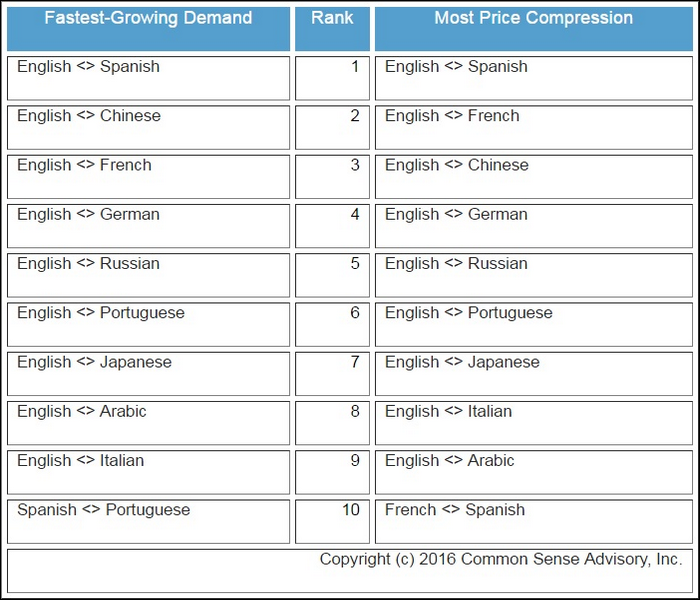
Top 10 most popular languages on the Internet
Italian took only 11th place in the ranking, and Polish, who took 17th place, is gaining more and more popularity and is often found in popular language pairs.
The latest study by the agency Common Sense Advisory in March 2016 showed that the cost of translating the most common language pairs does not have a clear linear relationship. This is due to the fact that translation prices may decline while demand is growing due to the high competition in the language services market.
The rating of demand for languages depends not only on the number of speakers, but also on the influence of the country's economy on the world market.
English is the language of international communication and in many countries it is the official state language. Mandarin (Chinese) is the language of international business and it is not surprising at all. It is the most used language in the whole world, and the Chinese economy takes the 2nd place by the nominal value of GDP in the country. The Brazilian economy is ranked 9th in the world and its growth will continue for at least another 5 years, according to the International Monetary Fund . About 274 million people speak French in the world, in 29 countries it is the state language. Japan is the 3rd largest country in terms of GDP. It is a world leader in the automotive industry and high technology, which makes knowledge of Japanese in demand in the language services market. About 240 million people speak Arabic and in 23 countries it is official. The UAE is the world leader in the oil market.
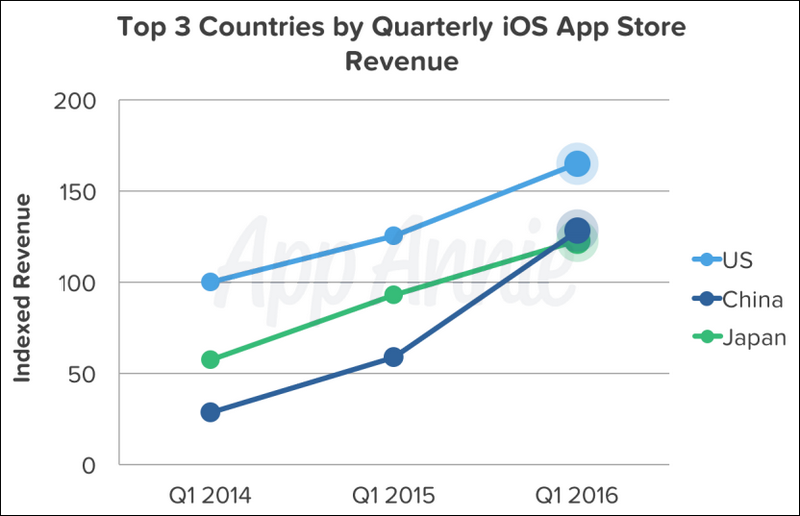
The first quarter of 2016 was significant for the global market of mobile iOS applications. China for the first time overtook Japan in terms of revenue from sales and took 2nd place in the ranking of countries in terms of income from mobile applications - over the past 4 months, China's income has increased by more than 2 times. This growth was mainly due to mobile games.
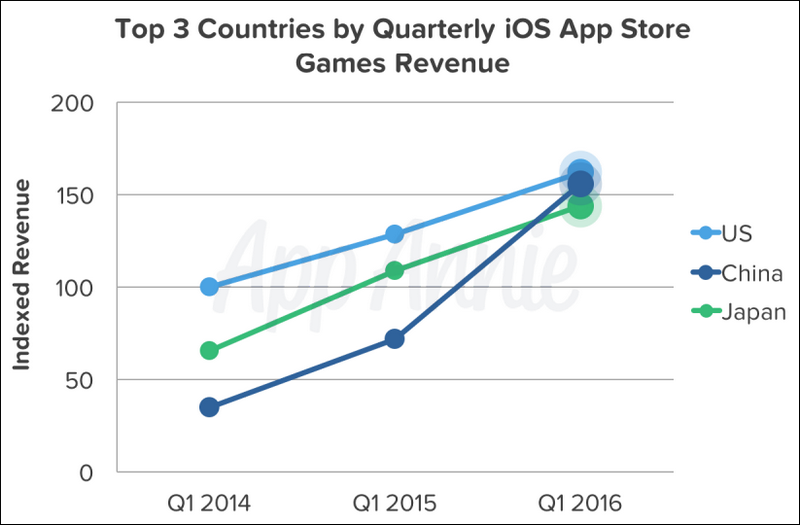
Having ousted Japan from the second position in terms of revenue from applications on both platforms, China came very close to the leader in the rating for mobile games in the App Store - USA. According to App Annie , this year China will become the undisputed leader in revenue from sales of games on the platform from Apple .
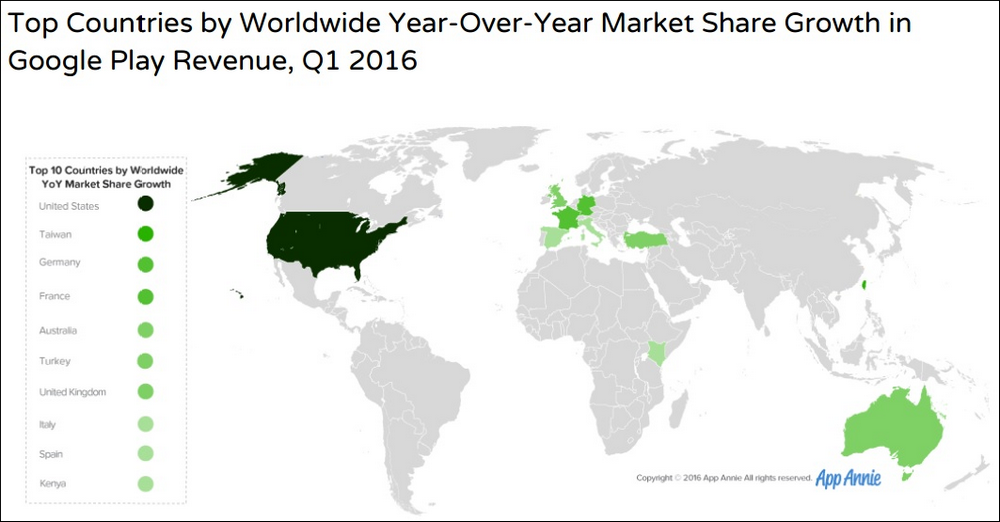
After analyzing the data on the most common languages, popular language pairs, the number of downloads and income from mobile applications by country, we will make a rating of the languages into which developers should localize their applications to increase profits.
It is worth adding that the Google Play mobile app store in China is still not there. Chinese developers are guided by the local stor for Android- products, so the revenues from the sale of applications on the platform from Google are quite low.
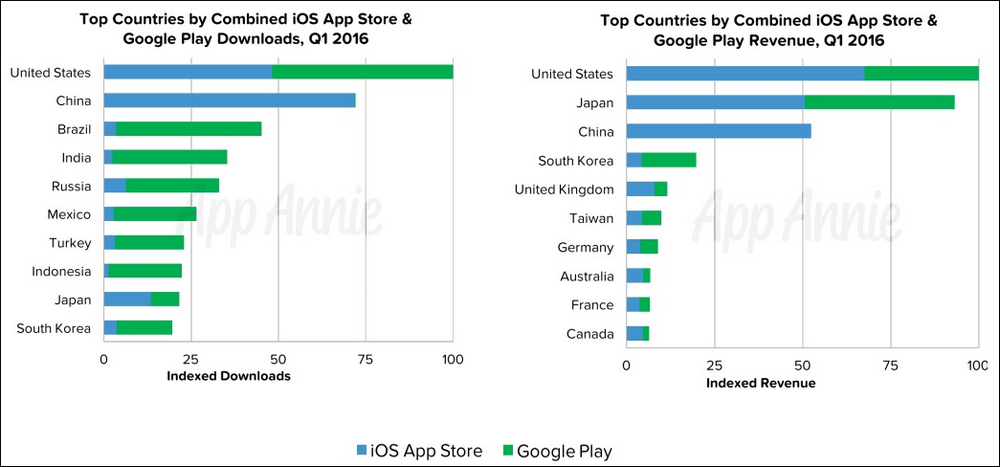
Top 5 languages for localizing iOS applications
Top 5 languages for localizing Android applications
Localization of games and applications is in fact a translation, but it requires the possession of special programmer and technical skills. Therefore, localization is the most labor-intensive linguistic services industry. A language specialist should not only perfectly know the language, but also have a basic developer knowledge to localize the individual menu items and interface. In addition, the localization specialist should be well versed in the subject of the application and have at least minimal experience with such applications and resources. Localization of games is even more difficult. Here the translator is required to be a little gamer himself and have a good imagination. In mobile games, the translator does not just interpret the text into another language, but literally creates a separate version of the game in another language.
However, this is not all that affects the quality of localization. In the process of making transfers, a certain number of difficulties and problems arise. For example, different specialists can interpret the same phrases or words in the same places in different ways. You can learn more about this, about the types of localization, about the cost of localization services and how and where to order localization here .
Localization of applications makes it possible to enter the markets of other countries, thereby significantly increasing the number of downloads and, accordingly, profit. Research in the mobile marketing company Applead shows that the localization of the application page in Google Play and the AppStore increases conversion into installation by 25-30%, which will undoubtedly play a role in promoting mobile applications and increasing user involvement. A variety of options for monetization of the mobile application allows you to choose the most suitable model, and localization - to make a scalable profit generator of this model. It is foolish to miss the sources of possible income on the rise of the market in different countries, despite the fact that localization is a time consuming and laborious process. The growth of the global mobile advertising market, the increase in the number of smartphone users and the increasing interest of owners of smart mobile devices to applications makes it clear that localization is a necessary tool for expanding the client base in the world.

As research by App Annie has shown, Russia closes the top five countries in terms of the number of downloads of mobile applications on the App Store and the Google Play Market in the first quarter of 2016, but was not included in the top 10 in terms of sales revenue. Does this mean that developers should focus exclusively on the Western market to increase their profits, and if so, what language other than English can be translated, or rather, localized?
What is the difference between localization and translation?
')

Translation is the interpretation of text or speech from one language to another. It aims to convey the meaning of information without taking into account national characteristics, cultural values and in the case of the development of mobile applications - the usual user experience of residents of a particular country and features of the target audience.
Localization includes a whole range of technical tasks for adapting code, components and adding resources. It solves the problem of differences in culture, language and material perception of different nationalities. In essence, localizing an application means translating it so that the user doesn’t have any difficulty understanding and using the product, or assigning its functions.
That is, to translate means to interpret, and to localize to adapt.
The Internet is full of "sneering" with poor-quality translation of both applications and web content, but the literal translation and the lack of localization are not the same thing. There is often a substitution of concepts.

Localization is not just a high-quality translation , it is a semantic adaptation of the text that literally bites into the neural networks and user guts from a half-word. For example, if people in the CIS in e-commerce websites and applications are more accustomed to seeing the “Buy” button, then they don’t need to invent a bicycle and make a “Purchase goods” button. It would seem that a person already understands what is being said, but why complicate his life? Or rather - yourself.
What makes localization
Residents of Brazil, Russia, China and India make up 40% of the population of the whole world. Ignoring the need to translate into Hindi, Mandarin or Portuguese, there is a chance to be thrown overboard by companies that incorporate these languages into their products. Monitoring the demand for localization of applications in a particular language will allow software companies to expand their customer base.
What languages rule the Internet

Top 10 most popular languages on the Internet
- English
- Chinese (simplified)
- Spanish
- Deutsch
- Japanese
- French
- Arab
- Portuguese (Brazilian)
- Russian
- Korean
Italian took only 11th place in the ranking, and Polish, who took 17th place, is gaining more and more popularity and is often found in popular language pairs.
The latest study by the agency Common Sense Advisory in March 2016 showed that the cost of translating the most common language pairs does not have a clear linear relationship. This is due to the fact that translation prices may decline while demand is growing due to the high competition in the language services market.
What caused this rating formation
The rating of demand for languages depends not only on the number of speakers, but also on the influence of the country's economy on the world market.
English is the language of international communication and in many countries it is the official state language. Mandarin (Chinese) is the language of international business and it is not surprising at all. It is the most used language in the whole world, and the Chinese economy takes the 2nd place by the nominal value of GDP in the country. The Brazilian economy is ranked 9th in the world and its growth will continue for at least another 5 years, according to the International Monetary Fund . About 274 million people speak French in the world, in 29 countries it is the state language. Japan is the 3rd largest country in terms of GDP. It is a world leader in the automotive industry and high technology, which makes knowledge of Japanese in demand in the language services market. About 240 million people speak Arabic and in 23 countries it is official. The UAE is the world leader in the oil market.
What do customers and translation service providers do with this data?
- Customers of translation services need to make sure that their multilingual applications are translated into all the most popular languages, and also to make sure that the cost of translation for which they pay, corresponds to the market.
- Language service providers should monitor the market demand for language pairs in order to properly allocate resources, and also compare popular language pairs with their capabilities and prioritize them to the most cost-effective ones.
Mobile App Market Overview

The first quarter of 2016 was significant for the global market of mobile iOS applications. China for the first time overtook Japan in terms of revenue from sales and took 2nd place in the ranking of countries in terms of income from mobile applications - over the past 4 months, China's income has increased by more than 2 times. This growth was mainly due to mobile games.

Having ousted Japan from the second position in terms of revenue from applications on both platforms, China came very close to the leader in the rating for mobile games in the App Store - USA. According to App Annie , this year China will become the undisputed leader in revenue from sales of games on the platform from Apple .
In which language to localize the application

After analyzing the data on the most common languages, popular language pairs, the number of downloads and income from mobile applications by country, we will make a rating of the languages into which developers should localize their applications to increase profits.
It is worth adding that the Google Play mobile app store in China is still not there. Chinese developers are guided by the local stor for Android- products, so the revenues from the sale of applications on the platform from Google are quite low.

Top 5 languages for localizing iOS applications
- English
- Chinese
- Japanese
- Deutsch
- French
Top 5 languages for localizing Android applications
- English
- Japanese
- Deutsch
- French
- Spanish
What skills should an application localization specialist have?
Localization of games and applications is in fact a translation, but it requires the possession of special programmer and technical skills. Therefore, localization is the most labor-intensive linguistic services industry. A language specialist should not only perfectly know the language, but also have a basic developer knowledge to localize the individual menu items and interface. In addition, the localization specialist should be well versed in the subject of the application and have at least minimal experience with such applications and resources. Localization of games is even more difficult. Here the translator is required to be a little gamer himself and have a good imagination. In mobile games, the translator does not just interpret the text into another language, but literally creates a separate version of the game in another language.
However, this is not all that affects the quality of localization. In the process of making transfers, a certain number of difficulties and problems arise. For example, different specialists can interpret the same phrases or words in the same places in different ways. You can learn more about this, about the types of localization, about the cost of localization services and how and where to order localization here .
Localization of applications makes it possible to enter the markets of other countries, thereby significantly increasing the number of downloads and, accordingly, profit. Research in the mobile marketing company Applead shows that the localization of the application page in Google Play and the AppStore increases conversion into installation by 25-30%, which will undoubtedly play a role in promoting mobile applications and increasing user involvement. A variety of options for monetization of the mobile application allows you to choose the most suitable model, and localization - to make a scalable profit generator of this model. It is foolish to miss the sources of possible income on the rise of the market in different countries, despite the fact that localization is a time consuming and laborious process. The growth of the global mobile advertising market, the increase in the number of smartphone users and the increasing interest of owners of smart mobile devices to applications makes it clear that localization is a necessary tool for expanding the client base in the world.
Source: https://habr.com/ru/post/304870/
All Articles